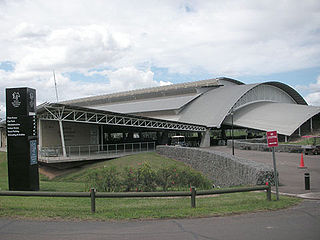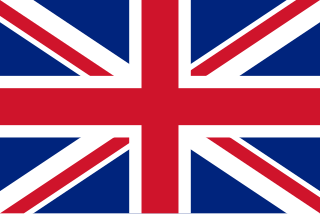
Germany competed at the 2004 Summer Olympics in Athens, Greece, from 13 to 29 August 2004. This was the nation's fourth consecutive appearance at the Summer Olympics after its reunification in 1990. The German Olympic Sports Confederation sent the nation's second largest delegation to the Games since its reunification. A total of 441 athletes, 250 men and 191 women, competed in 27 sports, and were nominated by DOSB at four occasions.

The individual show jumping event, part of the equestrian program at the 2004 Summer Olympics, was held from 22 to 27 August 2004 in the Olympic Equestrian Centre on the outskirts of Markopoulo in the Attica region of Greece. Like all other equestrian events, the jumping competition was mixed gender, with both male and female athletes competing in the same division. There were 77 competitors from 27 nations. Each nation could send up to 4 riders. Cian O'Connor of Ireland initially received the gold medal, but that medal was stripped from him due to doping. After his disqualification, the event was won by Rodrigo Pessoa of Brazil, the nation's first medal in individual jumping. Silver went to Chris Kappler of the United States, with bronze to Marco Kutscher of Germany.

Ludger Beerbaum is an internationally successful German equestrian who competes in show jumping and has been ranked the No. 1 Show Jumper in the world by the FEI on multiple occasions. He is also a four-time Olympic Gold medalist team and individual.

Germany competed at the 2012 Summer Olympics in London, from 27 July to 12 August 2012. This was the nation's sixth consecutive appearance at the Summer Olympics after its reunification in 1990. The German Olympic Sports Confederation sent the nation's smallest delegation to the Games since its reunification. A total of 392 athletes, 218 men and 174 women, competed in 23 sports, and were nominated by DOSB on four occasions.
The equestrian events at the 2012 Olympic Games in London were held between 28 July and 9 August at Greenwich Park. Medals were awarded in three disciplines for both individual and team competitions.

Sweden competed at the 2012 Summer Olympics in London, from 25 July to 12 August 2012. Swedish athletes have competed at every edition of the Summer Olympic Games in the modern era, except for the 1904 Summer Olympics in St. Louis. The Swedish Olympic Committee sent a total of 134 athletes to the Games, 55 men and 79 women, to compete in 20 sports. For the second consecutive time in its Olympic history, Sweden was represented by more female than male athletes.

The individual show jumping event, part of the equestrian program at the 2000 Summer Olympics, was held from 25 September to 1 October 2000 at the Sydney International Equestrian Centre 45 miles outside of Sydney, Australia. Like all other equestrian events, the jumping competition was mixed gender, with both male and female athletes competing in the same division. There were 74 competitors from 28 nations. Each nation could have up to 4 riders. The event resulted in a three-way tie for first and a medal jump-off. Dutch riders Jeroen Dubbeldam and Albert Voorn finished first and second in that jump-off, earning the Netherlands' first gold medal and second silver medal in individual jumping. Khaled Al Eid earned Saudi Arabia's first medal in the event with his bronze, finishing third in the jump-off.

The individual jumping in equestrian at the 2012 Olympic Games in London was held at Greenwich Park from 4 to 8 August. Like all other equestrian events, the jumping competition was mixed gender, with both male and female athletes competing in the same division. There were 75 competitors from 26 nations. The event was won by Steve Guerdat of Switzerland, the nation's first victory in individual jumping since 1924 and second overall. Gerco Schroder of the Netherlands took silver. Cian O'Connor of Ireland, who had been stripped of a gold medal in the event in 2004, earned bronze—Ireland's first medal in the event.
The equestrian events at the 2016 Summer Olympics in Rio de Janeiro were held between 6 and 19 August at National Equestrian Center in Deodoro. Medals were awarded in three disciplines for both individual and team competitions.

Great Britain, or in full Great Britain and Northern Ireland, represented by the British Olympic Association (BOA), the previous host of the 2012 Olympics at London, competed at the 2016 Summer Olympics in Rio de Janeiro, Brazil, from 5 to 21 August 2016 and the team of selected athletes was officially known as Team GB. British athletes have appeared in every Summer Olympic Games of the modern era, alongside Australia, France, Greece, and Switzerland, though Great Britain is the only country to have won at least one gold medal at all of them. The team represented the United Kingdom, the three Crown Dependencies, and the thirteen British Overseas Territories, ten of whom sent representatives.

The individual show jumping in equestrian at the Rio 2016 Summer Olympics was held from 14–19 August. Like all other equestrian events, the jumping competition was mixed gender, with both male and female athletes competing in the same division. There were 74 competitors from 27 nations. The event was won by Nick Skelton of Great Britain, the nation's first victory in individual jumping and first medal of any color since making the podium four consecutive Games from 1960 to 1972. Silver went to Peder Fredricson of Sweden. Eric Lamaze of Canada took bronze, becoming the first person since 1968 and sixth overall to win multiple medals.

Turkey competed at the 2016 Summer Olympics in Rio de Janeiro, Brazil, from 5 to 21 August 2016. Since the nation's debut in 1908, Turkish athletes have appeared in every edition of the Summer Olympic Games, except for three occasions. Turkey failed to register any athletes at the 1920 Summer Olympics in Antwerp, did not attend the 1932 Summer Olympics in Los Angeles at the period of worldwide Great Depression, and also joined the United States-led boycott, when Moscow hosted the 1980 Summer Olympics. The Turkish team consisted of 103 athletes, 55 men and 48 women, across twenty-one sports.

The individual show jumping event, part of the equestrian program at the 1996 Summer Olympics, was held from 29 July to 1 August 1996 at the Georgia International Horse Park, in Conyers, Georgia. Like all other equestrian events, the jumping competition was mixed gender, with both male and female athletes competing in the same division. There were 82 competitors from 24 nations. Each nation could have up to 4 riders. The event was won by Ulrich Kirchhoff of Germany, the nation's second consecutive victory in the individual jumping. It was the fourth consecutive Games at which Germany competed that the nation reached the podium in the event—gold in 1936 and bronze in 1952, before gold again in 1992 and 1996. The silver medal went to Wilhelm Melliger of Switzerland and the bronze to Alexandra Ledermann of France, the two of whom came out on top of a seven-way jump-off for second place.
The 200 quota places for equestrian at the 2020 Summer Olympics were divided between the three disciplines. The 2020 Olympics were postponed to 2021 due to the COVID-19 pandemic. Teams in each discipline consisted of three horse and rider pairs; any NOC that qualified a team also received 3 entries in the individual competition for that discipline. NOCs that did not qualify teams could earn one individual place in dressage and jumping, and up to two individual places in eventing, for a total of 15 entries in jumping and dressage and 20 for eventing. Teams qualify primarily through specific competitions, while individuals qualify through rankings. The host nation, Japan, automatically qualified a team in each discipline.

Ukraine competed at the 2020 Summer Olympics in Tokyo. Originally scheduled to take place from 24 July to 9 August 2020, the Games were postponed to 23 July to 8 August 2021, due to the worldwide COVID-19 pandemic. It was the nation's seventh consecutive appearance at the Summer Olympics in the post-Soviet era with its smallest representation ever.

The individual show jumping event at the 2020 Summer Olympics is scheduled to take place on 3–4 August 2021 at the Baji Koen. Like all other equestrian events, the jumping competition is mixed gender, with both male and female athletes competing in the same division. 75 riders from 35 nations are expected to compete.
The individual show jumping at the 1988 Summer Olympics took place between 26 September and 2 October at the Seoul Olympic Stadium. It featured a significant change to the competition format from prior years. The event was open to men and women. There were 74 competitors from 24 nations. Each nation could have up to 4 riders, up from 3 in previous years. The event was won by Pierre Durand Jr. of France, the nation's first victory in individual jumping since 1964 and fourth overall—most of any nation, moving out of a tie with Italy at three. Silver went to Greg Best of the United States, with bronze to Karsten Huck of West Germany.

The individual show jumping at the 1992 Summer Olympics took place between 4 and 9 August at the Real Club de Polo de Barcelona. The event was open to men and women. There were 87 competitors from 30 nations. Each nation could have up to 4 riders. The event was won by Ludger Beerbaum of Germany, the nation's second victory in individual jumping. It was the third consecutive Games at which Germany competed that the nation reached the podium in the event—gold in 1936 and bronze in 1952. Piet Raymakers earned the Netherlands' first medal in the event with his silver. The United States reached the podium for the third consecutive Games with Norman Dello Joio's bronze.
The equestrian events at the 2024 Summer Olympics in Paris were run from 27 July to 6 August at the Palace of Versailles, featuring 200 riders across three disciplines for both individual and team competitions, namely dressage, eventing, and jumping. Men and women compete together on equal terms.
The 200 quota places for equestrian at the 2024 Summer Olympics were divided between the three disciplines. Teams in each discipline consisted of three horse and rider pairs; any NOC that qualified a team also received three entries in the individual competition for that discipline. NOCs that did not qualify teams could earn one individual place in dressage and jumping and up to two individual places in eventing, for a total of 15 entries in jumping and dressage and 17 for eventing. Teams qualify primarily through specific competitions, while individuals qualify through rankings. The host nation, France, automatically qualified a team in each discipline.















